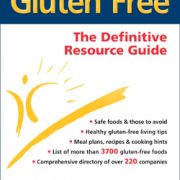Kids with Celiac Disease Report Lower Health-Related Quality of Life

- Contributing Writer , clinicaladvisor.com 1
Pediatric patients with newly diagnosed celiac disease (CD) reported lower health-related quality of life (HRQOL) when compared with healthy children with nonceliac gastrointestinal (GI) complaints, according to a study published in the Journal of Pediatric Gastroenterology & Nutrition.
CD is a common chronic condition associated with broad range of physical and psychosocial problems.
In this study, the pediatric quality of life inventory (PedsQL 4.0) was administered to patients aged 21 months to 18 years who were newly diagnosed with CD (N=159) and to their parents, at the time of diagnostic esophagogastroduodenoscopy or before the initial dietitian appointment for gluten-free diet instruction. All patients had been eating a regular diet or had been restricting gluten for less than 6 weeks at time of assessment. Researchers calculated the mean parent-report and self-report PedsQL summary and subscale scores, and compared the results with published means from healthy children and a group of children with nonceliac GI conditions (irritable bowel syndrome, functional abdominal pain, and organic GI disorders) (N=287).
On the parent report, compared with healthy children, scores for children newly diagnosed with CD were significantly lower for total score (t[156]=-4.73; P <.008), physical health (t[156]=-3.82; P <.008), psychosocial health (t[142]=-4.19; P <.008), emotional functioning (t[156]=-4.67; P <.008), and school functioning (t[141]=-4.83; P <.008).
When comparing the self-reported PedQL and subscale scores between the CD group and the healthy sample, the CD group had significantly lower self-reported total scores (t[103]=-5.69; P <.008), physical health (t[103]=-5.22; P <.008), psychosocial health (t[103]=-4.96; P <.008), emotional functioning (t[103]=-3.98; P <.008), and school functioning (t[101]=-7.43; P <.008).
There were significant differences between the parent-reported CD group and nonceliac group in psychosocial health (t[141]=3.02; P <.008) and emotional functioning (t[156]=4.59; P <.008), with the CD group reporting higher scores than the nonceliac group. There were no other significant differences between the CD and nonceliac groups in any of the other categories. There were also no differences in any self-reported scores between the CD and nonceliac groups.
Limitations include the use of published means for the healthy control group of children and the nonceliac GI group rather than concurrent collected group data, which did not allow for matching on demographic variables. Additionally, researchers did not have information about the timing of the nonceliac group’s completion of questionnaires in relation to diagnosis. Furthermore, the use of a more disease-specific validation tool like the Celiac Disease DUX for newly diagnosed patients may provide more information.
- “Given the high rates of decreased school, emotional, and physical functioning found in newly diagnosed patients with CD, we recommend assessing HRQOL in patients at diagnosis to establish a baseline and intervene early when necessary,” the researchers advised.
“Meeting with a psychologist or social worker may help promote coping and adjustment. It is important to consider the far-reaching implications of CD at diagnosis, as further interventions may help those patients who do have clinically significant abnormal scores in different domains of HRQOL.”
Disclosure: Several study authors declared affiliations with the pharmaceutical industry. Please see the original reference for a full list of authors’ disclosures.
Reference – Shull MH, Ediger TR, Hill ID, Schroedl RL. Health-related quality of life in newly diagnosed pediatric patients with celiac disease. J Pediatr Gastroenterol Nutr. 2019;69(6):690-695.
This article originally appeared on Gastroenterology Advisor
- 1 https://www.clinicaladvisor.com/home/topics/gastroenterology-information-center/pediatric-patients-with-newly-diagnosed-celiac-disease-report-lower-hrqol/

















